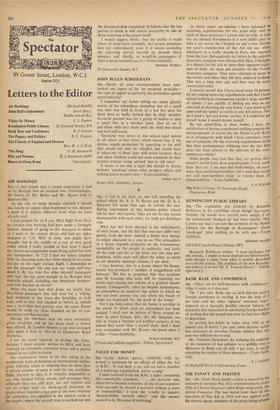SIR,—I feel it my duty, as one still attending the
school which Mr. S. A. N. Raven and Mr. D. A. J. Simpson left some time ago, to correct the con- flicting impressions of this famous public school left by their two reports. They are not by any means incompatible with each other, for both are doubtless true.
What has not been stressed is the individuality of each house, and the fact that one may differ very greatly from the next—indeed, a house may change its whole character in a year or so. The atmosphere in a house depends primarily on the housemaster, secondarily on the people in authority, and lastly on the rank and file of the boys; any one may pre- dominate, while each will affect the other, as much as art unstable national climate, I am sure.
I too, however, live in a house where the house- master has produced a 'midden of priggishness and betrayal.' We live in perpetual fear that someone may be listening who soon will be repeating our words and relating our actions to a grateful house- master. Consequently, since he became housemaster, an atmosphere of suspicion has arisen, in which no one can trust anyone else and where the basest of tricks are employed `for the good of the house.'
Yet I am fully aware that our house is peculiar in the extent to which such an atmosphere has been created. I shall ever be jealous of those around me now, in other houses, who, like Mr. Simpson, are able to retain a 'warmer and kindlier memory of the school they serve' than I myself shall. And I shall ever sympathise with Mr. Raven—we know what it is like.—Yours faithfully,
PUBLIC-SCHOOL BOY [Name and address supplied.—Editor, Spectator.]


































 Previous page
Previous page